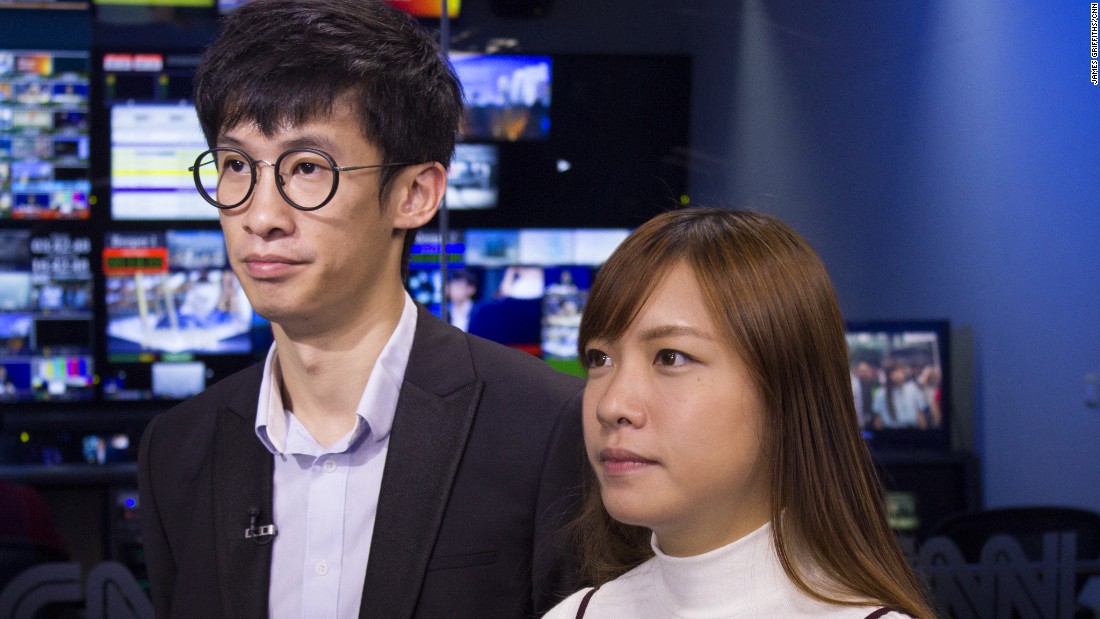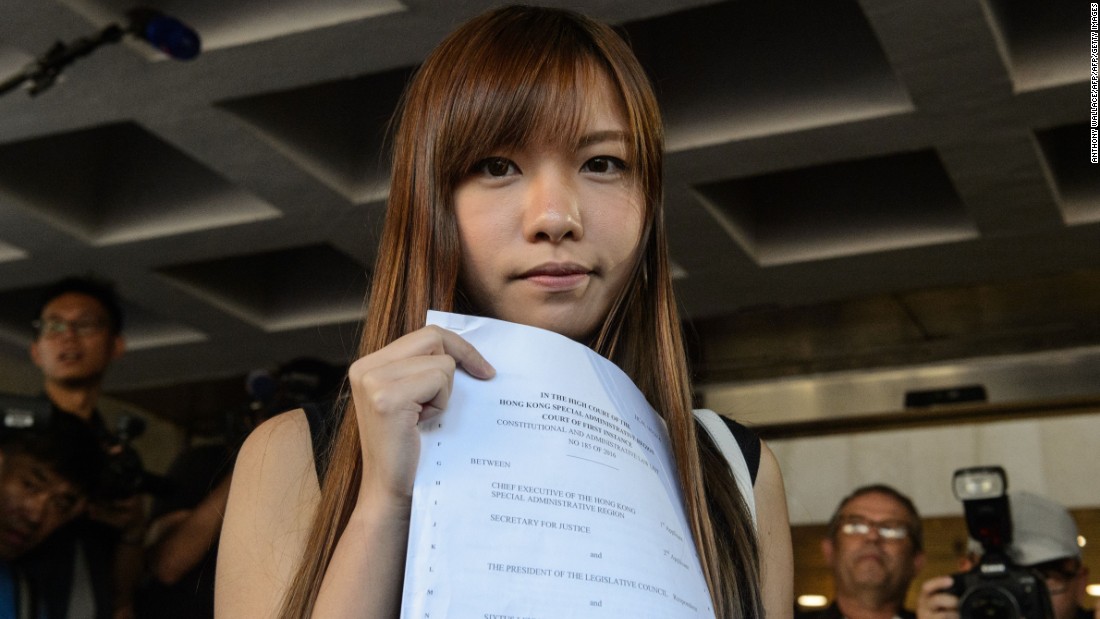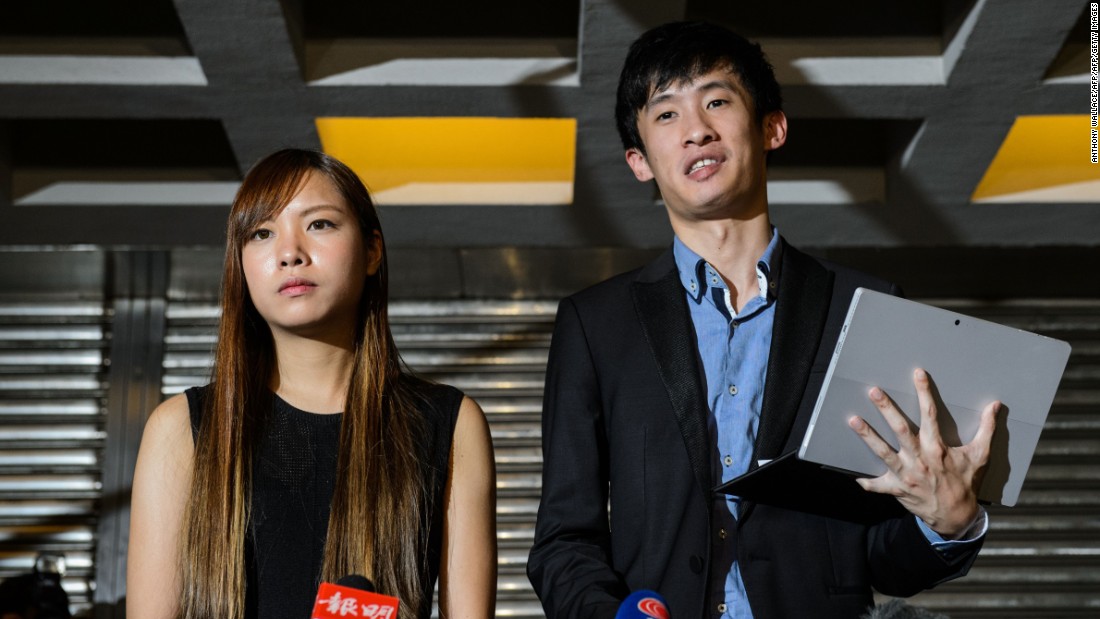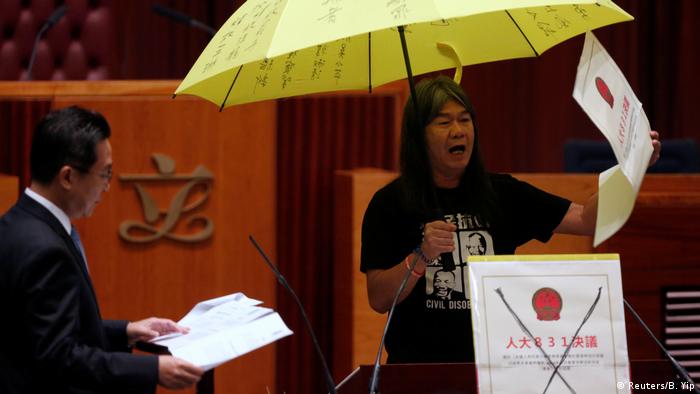
Hong Kong -- Yau Wai-ching and Sixtus "Baggio" Leung would be forgiven for feeling a little shell shocked.
They've gone from being stars of Hong Kong's nascent independence movement, to public enemy number one, criticized in newspapers and on television, and harassed online.
In September, the pair were elected to Hong Kong's parliament, LegCo, where they joined a raft of other young lawmakers favoring greater autonomy for the city or even independence from China.
"When we were elected, our battle between the people and government was just starting," Yau, a 25-year-old former community worker, told CNN.
That battle has escalated far quicker than anyone could imagine.
On November 2, Yau and Leung were dragged from LegCo by security guards as they found themselves at the center of a legal battle that threatens to undermine the city's already shaky political system.
Oathgate
The saga began as lawmakers were taking their oaths of office last month.
While pro-democracy politicians have used the ceremony as a venue for protest in the past, Yau and Leung took it a step further.
They swore and insulted China and displayed flags with the words "Hong Kong is not China," leading to their oaths being rejected, along with several other lawmakers who flubbed their vows.
The pair were due to retake their oaths properly the following week when everything got a lot more complicated.
They swore and insulted China and displayed flags with the words "Hong Kong is not China," leading to their oaths being rejected, along with several other lawmakers who flubbed their vows.
The pair were due to retake their oaths properly the following week when everything got a lot more complicated.
Hong Kong government officials sued to prevent them being sworn-in again, arguing they had forgone their opportunity.
Before the court could rule, Beijing too waded in, using a rarely-used power to re-interpret Hong Kong's constitution.
Before the court could rule, Beijing too waded in, using a rarely-used power to re-interpret Hong Kong's constitution.

Yau and Leung could not retake their oaths, and would not become lawmakers, Beijing said.
This was later backed up by a Hong Kong court, though the pair are appealing.
"We were elected by over 50,000 voters," Leung said, adding that he was fighting to "protect our system and the separation of powers and the rule of law."
Yau defended the pair's protest as a tradition, pointing to occasions in the past where other lawmakers used the oath-taking session "for a performance or chance to show their ideologies."
Displaying the flags was just a statement of fact, Leung added, "Hong Kong is not China."
They would not comment on the content of their oaths, due to the ongoing appeal.
"We were elected by over 50,000 voters," Leung said, adding that he was fighting to "protect our system and the separation of powers and the rule of law."
Yau defended the pair's protest as a tradition, pointing to occasions in the past where other lawmakers used the oath-taking session "for a performance or chance to show their ideologies."
Displaying the flags was just a statement of fact, Leung added, "Hong Kong is not China."
They would not comment on the content of their oaths, due to the ongoing appeal.
What's at stake?
Beijing's ruling came as a shock to much of Hong Kong.Last week, wearing black and led by a marshal holding a black umbrella, more than 2,000 lawyers marched on the city's top court, in a silent demonstration against what they saw was a blow to the city's judicial autonomy.
"This is treachery on behalf of the (Chinese government) to the Hong Kong people. How can they ever trust them again?" said Alan Leong, a former barrister and co-founder of the pro-democracy Civic Party, adding that Beijing's ruling was "completely unnecessary."
The fear is that Beijing's interpretation, which requires officials to pledge allegiance to Hong Kong as an inalienable part of China, will undermine judicial independence and the "one country, two systems" principle under which the city is governed.
"By preventing the two pro-independence politicians from taking office, the Chinese government has opened the door to disqualify anyone from Hong Kong's government if they are determined to not be loyal to Beijing," pro-democrat lawmaker Claudia Mo wrote in an op-ed after the ruling.
Some fear that Beijing is also indicating a willingness to change the constitution at will.
Before the most recent interpretation, the power had only been used four times in the past 19 years.

Why did Beijing act?
The oath-taking saga comes amid increasing support in Hong Kong for independence from China, which has caused concern and outrage in Beijing.
In the run-up to the LegCo elections in September, several pro-independence candidates were banned from taking part, including Edward Leung (no relation to Baggio), then the city's most famous separatist politician.
Yau and Leung's actions "hit the bottom line of the 'one country, two systems' principle and posed a grave threat to national sovereignty and security," China's top lawmaking body said in a statement this month.
Chinese foreign ministry spokesman Geng Shuang said last week that "pro-independence forces in Hong Kong want to split the nation."
Leung accused his and Yau's critics of "blaming the victim," and argued that it is Beijing which has fostered support for independence through its heavy-handed actions.
"They're the ones who caused a generation of Hong Kongers to think that 'one country, two systems,' isn't working," he said.
Yau added that people should recognize the arrangement is "a failed experiment, no country would choose to rule a city in this way."
If Hong Kong does not become independent, she said, then it is just the same as any other Chinese city.
In the run-up to the LegCo elections in September, several pro-independence candidates were banned from taking part, including Edward Leung (no relation to Baggio), then the city's most famous separatist politician.
Yau and Leung's actions "hit the bottom line of the 'one country, two systems' principle and posed a grave threat to national sovereignty and security," China's top lawmaking body said in a statement this month.
Chinese foreign ministry spokesman Geng Shuang said last week that "pro-independence forces in Hong Kong want to split the nation."
Leung accused his and Yau's critics of "blaming the victim," and argued that it is Beijing which has fostered support for independence through its heavy-handed actions.
"They're the ones who caused a generation of Hong Kongers to think that 'one country, two systems,' isn't working," he said.
Yau added that people should recognize the arrangement is "a failed experiment, no country would choose to rule a city in this way."
If Hong Kong does not become independent, she said, then it is just the same as any other Chinese city.
Despite widespread outrage over Beijing's intervention, including mass protests, Yau and Leung have also come in for a whirlwind of criticism, even from anti-Beijing quarters.
Chinese state media said that it was "the will and demand of the entire population of China" that the pair be ejected, and pro-Beijing groups staged a protest against them holding signs such as "Yau and Leung get out of China."
Chinese state media said that it was "the will and demand of the entire population of China" that the pair be ejected, and pro-Beijing groups staged a protest against them holding signs such as "Yau and Leung get out of China."
While other pro-democrat lawmakers have largely stood in solidarity with the pair, outside LegCo reaction has been decidedly mixed, with some supporters even expressing frustration over Yau and Leung's actions.

While Yau and Leung said they are determined to keep fighting to the end (the case has not yet reached Hong Kong's Court of Final Appeal), it is clear events are taking their toll.
"Most Hong Kongers are sympathetic to us," Yau said.
At times however, criticism has turned personal.
The youngest woman ever elected to LegCo, Yau has frequently been the target of offensive and sexist comments, and at a protest last month pro-Beijing groups displayed a naked sex doll with her face on it.
While Yau denied that her gender has been a factor, she said the criticism has made her family worry for her safety.
Paraphrasing a song lyric by Canto-rock singer Candy Lo, Leung said he could handle being "abandoned by the world" so long as he had something to love.
"Hong Kong is like a sinking ship," he said, but one he hoped to save.
The youngest woman ever elected to LegCo, Yau has frequently been the target of offensive and sexist comments, and at a protest last month pro-Beijing groups displayed a naked sex doll with her face on it.
While Yau denied that her gender has been a factor, she said the criticism has made her family worry for her safety.
Paraphrasing a song lyric by Canto-rock singer Candy Lo, Leung said he could handle being "abandoned by the world" so long as he had something to love.
"Hong Kong is like a sinking ship," he said, but one he hoped to save.



